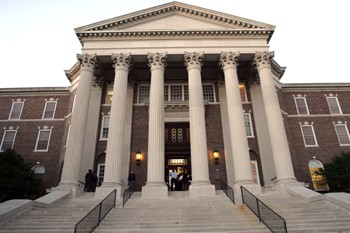
(John Schreiber)
Recommendations from SMU’s Drug Task Force include sweeping changes, such as an on-campus pub, and minor suggestions like creating an alcohol handbook to be distributed campus-wide.
All of the ideas in the 23-page report are just that right now – ideas. SMU President R. Gerald Turner is still deciding which options he deems feasible to implement. Parts of the Drug Task Force report were leaked late Thursday to CBS 11 and aired on the station’s 10 p.m. newscast, only hours after the report had finally reached Turner’s desk. SMU decided to release the full report to media outlets late Friday.
Initial reports included only three of the 30 recommendations that the task force created. The idea that has caused the most initial uproar calls for the creation of an on-campus pub.
The pub, according to the report, would serve beer and wine to those of legal drinking age along with snacks and other food. No hard liquor would be served. Rice University is given as a model to use if the pub is created.
Critics charge that giving students more access to alcohol isn’t a solution to the school’s drinking problems while supporters say that the environment of an on-campus pub would foster responsible drinking in a casual setting.
The report states that a secondary benefit to an on-campus pub would be the mingling of students and professors outside of the classroom. It says such an environment would break down the division between social and academic life at SMU.
The task force’s report is the result of 14 meetings and subsequent small-group discussions, town halls and focus groups from June – December 2007. The task force characterized its findings and recommendations by stating “changes are in order, but change in the sense of marked course correction rather than a complete turnaround.”
The recommendations presented in the report were broadly agreed upon within the task force, but not all of the ideas received unanimous support.
Some of the suggestions come from 13 different focus groups that the Task Force said were conducted and evaluated by social scientists who had done similar work across the nation.
The report stated SMU needs a culture shift between the academic and social parts of campus. It also called for a more united campus rather than one that is split between Greeks and non-Greeks or on-campus and off-campus students. One idea that the task force did not specifically recommend, but did support, is the creation of residential colleges. That suggestion was one of the centerpieces of the task force for Honors Programming that issued its own report in late Fall 2007 about the academic life of the university.
The Drug Task Force said that no single recommendation will cause a shift in campus culture or a change in the mindset of students. A combination of most or all of the recommendations “can be effective in bringing about positive change.” The task force said any change in campus attitudes would not occur immediately, most likely over a four – five year period.








